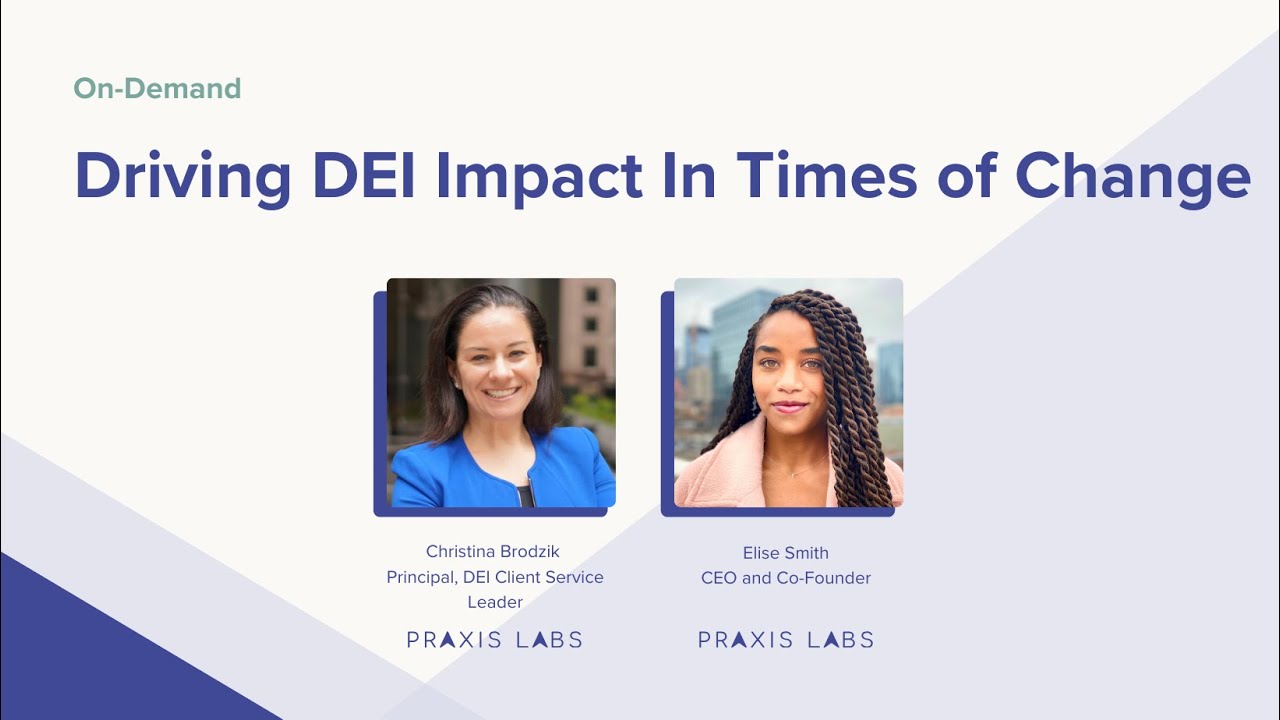Organizations today are at a turning point with DEI. A divided America and uncertain economic outlook are compelling Fortune 500 organizations to re-evaluate their DEI strategies and plan how to implement them for maximum impact. To discuss the future of DEI amidst these changing times, Praxis Lab CEO Elise Smith spoke to the national leader of Deloitte’s Principal – Equity Client Services practice, Christina Brodzik. Together, they discussed the outlook on DEI for 2024 and how HR teams can link DEI strategy and business outcomes in the coming year.
DEI is not on the decline
With 20 years of experience in the human capital space and expertise in inclusion strategy, Christina’s topline message was this: investment in DEI is far from slowing down.
“There’s a concern around this prevailing narrative that DEI initiatives are on the decline, that investment will fall as companies try to navigate what is felt to be a polarizing time, but it’s not true,” Christina said. A recent study by Gartner of 500 HR leaders reached the same conclusion: only 8% of companies reported a decline in their DEI budgets this year and 58% of respondents said that their companies have placed a stronger emphasis on DEI than in previous years.
“Regarding investment — for the majority of our clients — things were staying the same or had a slight uptick. People are cutting back in general today in response to the uncertain market environment. So if DEI investment is decreasing, it’s decreasing proportionally to other cuts across the organization.” Christina said.
So, what are people prioritizing with more scrutiny on spending? Christina broke it down for us:
1. The focus on impact-driven DEI learning experiences is bigger now than ever
“I’m really seeing people prioritize actions that can drive tangible business outcomes,” Christina said. She continued that companies have realized that investing in a culture of inclusion reduces costs associated with turnover and recruitment. Additionally, they’ve found that diverse and inclusive product innovation leads to better business. Getting proof of ROI has become less difficult, as these programs migrate to fully digital platforms and organizations are getting better about reporting their data. Deloitte, for example, publishes an annual Transparency Report benchmarking their progress against their goals.
2. Don’t limit training to junior staff or new hires
Christina stressed the importance of not limiting DEI training to new hires. For example, when HR personnel assume a senior “talent influencer” role in an organization, they often receive no additional training. Christina recommended offering comprehensive talent lifecycle training to recently promoted senior leaders. This promotes a more cohesive, aligned approach across all levels of the organization.
3. Train people (again!)
DEI leaders are sometimes divided on whether to dust off old programs, since they may contain outdated information. “Of course, every five years it’s good to give these programs a refresh,” Christina says. “But it’s never bad to train people again.” This way, everyone is given the opportunity to engage with key DEI resources. It never hurts to see something twice.
4. Embrace change when something isn’t working
“Don’t be too proud to pivot if you aren’t getting the results you expected,” Christina said. It’s important that your DEI work stays goal-oriented, and this can only happen if you continually monitor progress. “Impact is everything,” she stressed.
5. Prioritize performance management
Nothing, in Christina’s opinion, is more critical to DEI outcomes than a robust performance management process. “Making sure that people get the same amount of feedback and the same quality feedback, I can’t stress how important it is to get that right,” she said.
Stay the course
DEI success can sometimes feel like a moving target. But regardless of what your organization’s specific goals are, the driving force remains the same: DEI plays an outsized role on employee experience, which in turn yields greater returns for your business and society at large.
“DEI is the most meaningful work I’ve ever gotten to do,” Christina said about her work. “And it feels great to know that even in a corporate setting, I can make the world a better place.”
